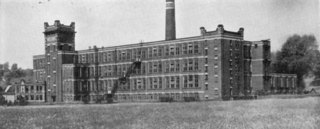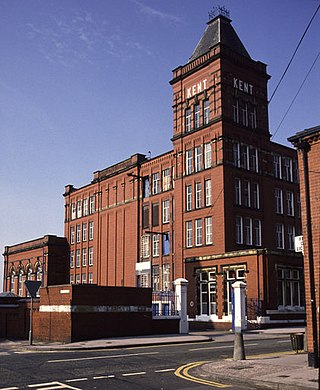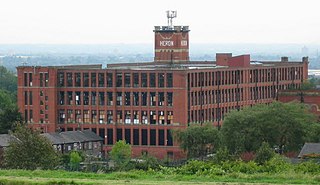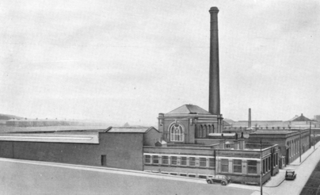
Droylsden is a town in Tameside, Greater Manchester, England, 4.1 miles (6.6 km) east of Manchester city centre and 2.2 miles (3.5 km) west of Ashton-under-Lyne, with a population at the 2011 Census of 22,689.
Fine Spinners and Doublers was a major cotton spinning business based in Manchester, England. At its peak it was a constituent of the FT 30 index of leading companies on the London Stock Exchange.

Rutland Mill was a cotton spinning mill on Linney Lane, in Shaw and Crompton, Greater Manchester, England. It was built by F. W. Dixon & Son in 1907 for the Rutland Mill Co. Ltd. It was taken over by the Lancashire Cotton Corporation in 1935. By 1964, it was in the Courtaulds Group. In the late 1980s, as Courtaulds moved operations to other parts of the world, the mill was bought by Littlewoods who demolished it and replaced it with a new automated storage warehouse.
Magnet Mill, Chadderton is a cotton spinning mill in Chadderton, Oldham, Greater Manchester. It was built by the Magnet Mill Ltd. in 1902, but purchased by the Lancashire Cotton Corporation in 1935. It was later taken over by the Courtaulds Group. Ceasing textile production in December 1966, it was demolished soon after. A suburban residential estate now occupies this site. It was driven by a 2200 hp twin tandem compound engine by George Saxon & Co, Openshaw, 1903. It had a 27-foot flywheel with 35 ropes, operating at 64½ rpm.

Ace Mill is a cotton spinning mill in Chadderton in the Metropolitan Borough of Oldham, Greater Manchester. It was built as Gorse No. 2 Mill, in 1914 and cotton was first spun in 1919 by the Ace Mill Ltd, who renamed the mill. It was taken over by the Lancashire Cotton Corporation in the 1930s and passed to Courtaulds in 1964. Production ended in 1967.

Fox Mill was a cotton spinning mill in Hollinwood, Oldham, Greater Manchester, England. It was taken over by the Lancashire Cotton Corporation in the 1930s and passed to Courtaulds in 1964.

Welkin Mill, Lower Bredbury is a cotton spinning mill in Lower Bredbury/Portwood, Stockport, Greater Manchester. It was built in the early years of the 20th century for ring spinning. It was taken over by the Lancashire Cotton Corporation in the 1930s and passed to Courtaulds in 1964. Production ended in 1967. The 162,000 sq ft (15,100 m2), four-storey mill occupies a 5.15 acres (2.08 ha) site on Welkin Road.

Saxon Mill, Droylsden was a cotton spinning mill in Droylsden, Tameside, Greater Manchester, England. It was built in the 1907, taken over by the Lancashire Cotton Corporation in the 1930s and passed to Courtaulds in 1964. Production finished in 1967, and the mill was demolished in 1995.

Kent Mill, Chadderton was a cotton spinning mill in Chadderton, Oldham, Greater Manchester. It was built in 1908 for the Kent Mill Co. It was taken over by the Lancashire Cotton Corporation in 1938 and passed to Courtaulds in 1964. Production finished in 1991 and it was demolished in 1994.

Heron Mill is a cotton spinning mill in Hollinwood, Oldham, Greater Manchester. It was designed by architect P. S. Stott and was constructed in 1905 by the Heron Mill Company Ltd next to Durban Mill. It was taken over by the Lancashire Cotton Corporation in the 1930s and passed to Courtaulds in 1964. Production ended in 1960, and it was used by Courtaulds for offices, warehousing, and some experimental fabric manufacture. Courtaulds occupation ended in 1994.

Textile Mill, Chadderton was a cotton spinning mill in Chadderton, Oldham, Greater Manchester, England. It was built in 1882 by Potts, Pickup & Dixon for the Textile Mill Co. Ltd, and closed in 1927. It was taken over by the Lancashire Cotton Corporation in the late 1940s and passed to Courtaulds in 1964 and used for cotton waste sorting. Half of the building was destroyed by fire on 11 July 1950, but the remaining section continued to be used for cotton waste sorting by W. H. Holt and Son until 1988.

Elm Mill, was a four-storey cotton spinning mill in Shaw and Crompton, Greater Manchester, England. It was built in 1890 for the Elm Spinning Company Ltd., and was called Elm Mill until it closed in 1928. It was revived by the Lancashire Cotton Corporation in 1929 and called Newby Mill. LCC and all their assets passed to Courtaulds in 1964. Production at Newby finished in 1970, and it was used for warehousing. Subsequently, named Shaw No 3 Mill, it became part of Littlewood's Shaw National Distribution Centre. It was demolished to make way for housing in 2022.

Royd Mill, Oldham was a cotton spinning mill in Hollinwood, Oldham, Greater Manchester, England. It was built in 1907, and extended in 1912 and 1924. It was taken over by the Lancashire Cotton Corporation in the 1930s and passed to Courtaulds in 1964. Production finished in 1981. The mill was demolished in 2015 to make way for a "DifRent" housing scheme.

Harp Mill was a former cotton spinning mill in the Castleton, Rochdale, Greater Manchester, England. Queensway, Castleton was a hub of cotton mills including the three 't', Th'Arrow, Th'Harp, and Th'Ensor. The 1908 Castleton map includes: Marland Cotton Mill, Castleton Cotton Mill, Globe Works, Arrow Cotton Mill, Harp Cotton Mill, Globe Leather Works, Castleton Size Works and Castleton Iron Works. Th'Harp was taken over by the Lancashire Cotton Corporation in the 1930s and passed to Courtaulds in 1964. The site now houses industrial units.

Mars Mill was a former cotton spinning mill in Castleton, Rochdale, Greater Manchester, England. Castleton joined the Borough of Rochdale in 1899. Queensway, Castleton was a hub of cotton mills; Mars, Marland, and Castleton Mill were a group of three. It was taken over by the Lancashire Cotton Corporation in 1935 and passed to Courtaulds in 1964 and demolished in the 1990s; Marland survived until 2004.

Fairfield is a suburb near Droylsden in Tameside, Greater Manchester, England. Historically in Lancashire, it is just south of the Ashton Canal on the A635 road. In the 19th century, it was described as "a seat of cotton manufacture". W. M. Christy and Sons established a mill that produced the first woven towels in England at Fairfield Mill.
Welspun Living Limited, previously known as Welspun India Limited, is an Indian textile manufacturing company headquartered in Mumbai, Maharashtra. Founded by Balkrishna Goenka in 1985, the company produces home textile products such as bed linen, terry towels, rugs, and yarn. Welspun operates several brands, including Christy, Spaces and Welhome, and is led by Dipali Goenka, who serves as the CEO and managing director.

William Miller Christy (1778–1858) was an English Quaker hat and textile manufacturer, known also as a banker. He is credited with the invention of the penny receipt-stamp.
Richard Haworth and Co. was established by Richard Haworth in 1854 as a cotton spinning and manufacturing firm in Cannon Street, Manchester, and Tatton Mill in Salford. Today the company is part of the Ruia Group which comprises a number of companies that import, supply and distribute textiles and hosiery to retailers and hospitality organisations. Richard Haworth Ltd. supplies a range of linens to the hospitality sector.

Samuel Holt was a British weaver, inventor and industrialist who emigrated to the United States in later life.
















